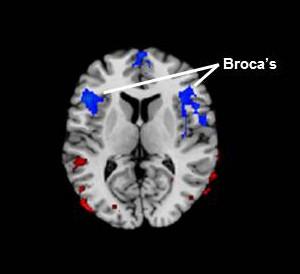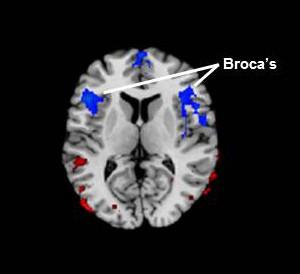
Credit: Children's Hospital Los Angeles
A study led by researchers at Children's Hospital Los Angeles demonstrates what lead investigator Bradley Peterson, MD, calls "a critical mass of evidence" of a common underlying lifelong vulnerability in both children and adults who stutter. They discovered that regional cerebral blood flow is reduced in the Broca's area – the region in the frontal lobe of the brain linked to speech production – in persons who stutter. More severe stuttering is associated with even greater reductions in blood flow to this region.
In addition, a greater abnormality of cerebral blood flow in the posterior language loop, associated with processing words that we hear, correlates with more severe stuttering. This finding suggests that a common pathophysiology throughout the neural "language" loop that connects the frontal and posterior temporal lobe likely contributes to stuttering severity.
Peterson, who is director of the Institute for the Developing Mind at CHLA and a professor of the Keck School of Medicine at the University of Southern California, says that such a study of resting blood flow, or perfusion, has never before been conducted in persons who stutter. His team also recently published a study using proton magnetic resonance spectroscopy to look at brain regions in both adults and children who stutter. Those findings demonstrated links between stuttering and changes in the brain circuits that control speech production, as well as those supporting attention and emotion. The present blood flow study adds significantly to the findings from that prior study and furthermore suggests that disturbances in the speech processing areas of the brain are likely of central importance as a cause of stuttering.
According to Peterson, the new study – published on December 30 in the journal Human Brain Mapping – provides scientists with a completely different window into the brain. The researchers were able to zero in on the Broca's area as well as related brain circuitry specifically linked to speech, using regional cerebral blood flow as a measure of brain activity, since blood flow is typically coupled with neural activity.
"When other portions of the brain circuit related to speech were also affected according to our blood flow measurements, we saw more severe stuttering in both children and adults," said first author Jay Desai, MD, a clinical neurologist at CHLA. "Blood flow was inversely correlated to the degree of stuttering – the more severe the stuttering, the less blood flow to this part of the brain," said Desai, adding that the study results were "quite striking."
###
Additional contributors to the study include Ravi Bansal, Children's Hospital Los Angeles and the Keck School of Medicine of USC; Yuankai Huo and Zhishun Wang, Columbia University; Steven C. R. Williams, David Lythgoe and Fernando O. Zelaya, King's College, London, UK. This work was supported in part by Children's Hospital Los Angeles, the National Institute of Mental Health grant K0274677, the Milhiser family fund and the Murphy endowment at Columbia University.
About Children's Hospital Los Angeles
Children's Hospital Los Angeles has been named the best children's hospital in California and among the top 10 in the nation for clinical excellence with its selection to the prestigious U.S. News & World Report Honor Roll. Children's Hospital is home to The Saban Research Institute, one of the largest and most productive pediatric research facilities in the United States. Children's Hospital is also one of America's premier teaching hospitals through its affiliation since 1932 with the Keck School of Medicine of the University of Southern California. For more information, visit CHLA.org. Follow us on Twitter, Facebook, YouTube and LinkedIn, or visit our blog at http://researchlablog.org/.
Media Contact
Ellin Kavanagh
[email protected]
323-361-8505
@childrensLA
http://www.childrenshospitalla.org





